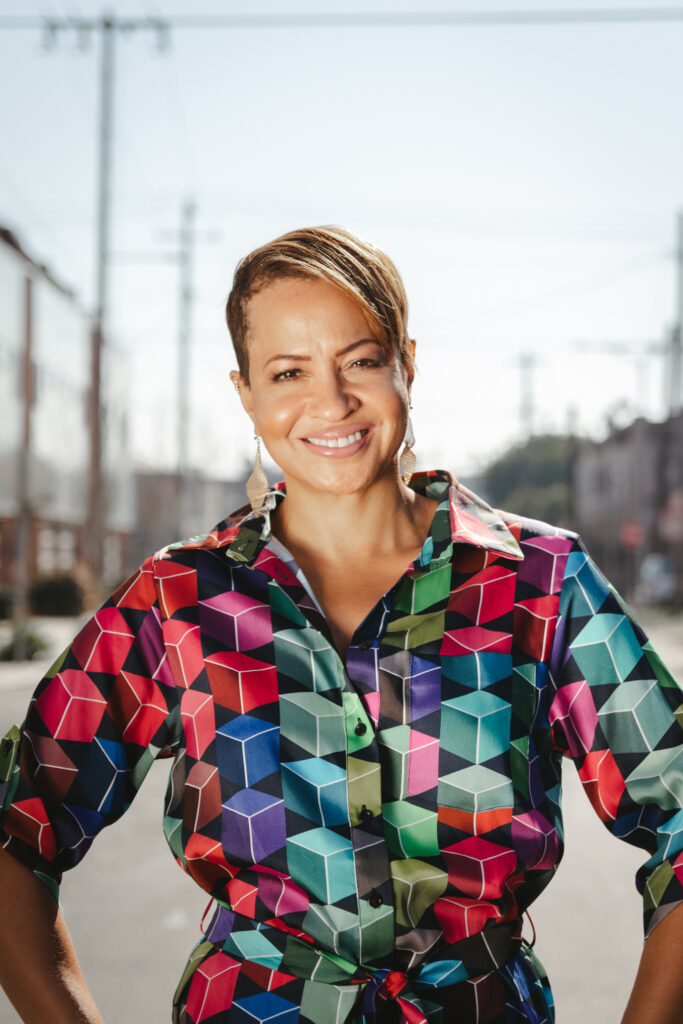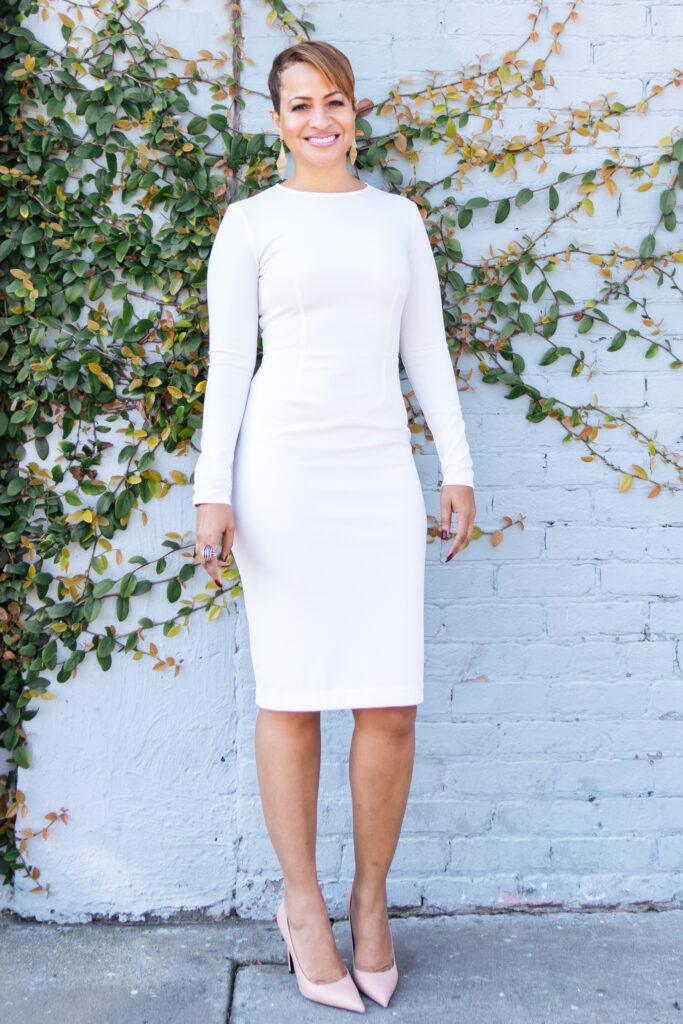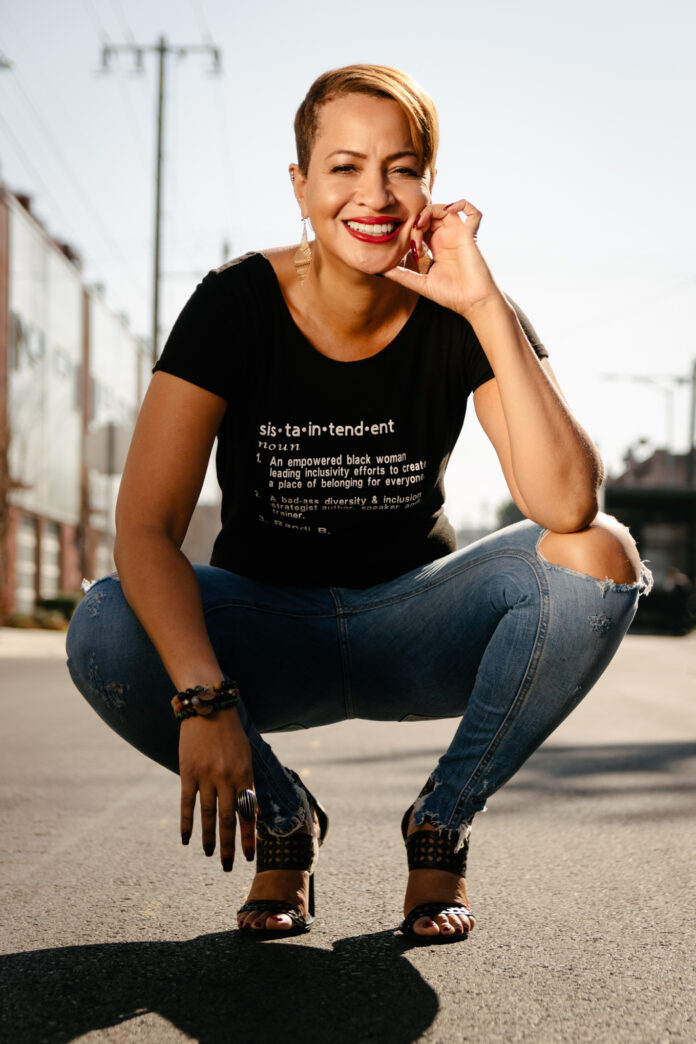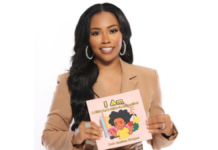( ENSPIRE Feature ) From TV, Books, And Social Media, Randi B. Provides Us With The Tools To Engage In Difficult But Necessary Conversations
ENSPIRE Contributor: Keegan Kerns
If there’s one thing Randi Bryant or Randi B. likes to champion, it’s the idea of open and honest conversation about difficult subjects like race, gender, and others in order to create positive change. It’s a lesson derived from her own varied experiences, ranging from diverse and respectful conversations had around the dinner table to learn about a wider world in which such conversations were avoided or quickly devolved into disrespectful dissent rather than discourse. In taking up this task of changing how we communicate, Randi B. has given herself a massive challenge, but as the Global Chief Diversity & Inclusion Officer of Freshworks, it’s one she has to deal with every day. After all, how do we help change the minds of those who are already set in their ways? However, if we look at Ms. Bryant’s own accomplishments, we see the achievability of this goal; the success of her consulting firm, her two books, and much more all show the great impact of just one person.
Ms. Bryant has continued her work for diversity and inclusion in her creation of social media sites such as the Lounge that help provide safe spaces for Black voices about Black issues and perspectives. With this endeavor, Ms. Bryant works towards giving groups like POC and women who are frequently unheard or ignored a voice with which to speak, whether it be about their workplace, society at large, or any issue they would like to discuss in an inclusive place. With this tool, no matter the location someone is at, they can always find others willing to listen to them and engage in the important conversations that enable us to grow.

Here are Ms. Bryant’s responses to questions regarding her mission and long list of experiences dealing with adversity.
ENSPIRE: You created Bryant Consulting Group almost 20 years ago, and it has continued to grow into a more influential business across those years. How do you find the energy to balance your work there alongside new endeavors such as your two books and social media sites such as the Lounge?
Randi: Both energy and time come easy when you are passionate about what you do. I get juiced about my mission to make environments more equitable, diverse and inclusive. In my history, I have been that person who wasn’t paid or treated the same as others, who was the “only” in a number of circumstances, and who has felt isolated in the workplace at various points in my life. It isn’t right and it doesn’t feel good. I am driven to create spaces where everyone has an equal opportunity to work and to prosper – all while being their authentic selves. For example, the fact that only 11 of 50 states have made it illegal to discriminate against someone based upon their hair texture underscores that there is so much work to do. I can’t afford to lose energy, to get tired, or to get distracted. No doubt, my newfound love affair with coffee has helped. But I also try to grant myself grace; to forgive myself when I can’t get as much done as I’d like.
ENSPIRE: You’ve discussed the difficulties in trying to talk about important subjects such as politics where people are often set in their ways on appearances on Real Talk and elsewhere. Do you think there’s ever a good time to bring these subjects up, and how would you manage the conversation so that both parties can hopefully go away having learned something?
Randi: At the beginning of my career, I never had to address conflicts due to conversations about politics. The last several years have been different: work teams (and families) have been fractured because people have such strong and differing opinions. I advise people not to talk about politics except with people with whom they have the type of relationship where conflicting ideas can be shared safely, without fear of emotional or relational stress. I have a group of friends who like to gather over a good meal and nice bottle of wine, and have intelligent debates. No one is trying to change anyone’s mind. We simply like learning, being challenged, and hearing different perspectives. Outside of situations like this, I don’t get the point of certain conversations: regardless of how eloquent a person is. There is less than a 1% chance of changing a person’s mind about a political candidate or religious belief. Engaging in these debates with work friends is pointless and can ultimately be destructive.
There are, however, other areas of opportunity. Many uncomfortable conversations can occur at work. You can’t talk about the lack of diversity in a company without discussing unconscious bias, the history of women in the workplace, systemic racism, and homophobia. You can’t make policies around healthcare and family leave without discussing the LGBTQIA community. People want diversity and inclusion to be easy – a holiday celebration, a feel-good training, a large check given to an organization. But real progress isn’t that easy. It takes work. It takes each person confronting their unconscious biases every day. It means that people must be willing to accept, own, apologize and decide to change when they’ve offended another person; and it involves respectfully informing someone when they have offended you (whether intentionally or not). It means that executives must honestly look at who holds the majority of leadership positions in the company; and begin to investigate any material disparities and to work to eliminate them. Having conversations is the only way to create a diverse, equitable and inclusive environment.
Having these conversations will most likely be uncomfortable, but it doesn’t have to be painful. The conversations should be approached with the attitude of everyone working together to achieve a common goal. For instance, if one of your non-Black colleagues oftentimes used AAVE (African American Vernacular English) only when speaking to you; and you found it irritating, you should ask the person if you two could have a conversation. You should wait to have the conversation until a time that you are calm and you have had time to think about what you want to say. To start the conversation, state what the mutual benefit is of you two having the conversation. For instance, “Jane, I think that we make a great team and I want us to continue to have a positive working relationship.” Next you can state the problem (and only the problem and not your analysis of the problem and the person). For example, in this case, you could say, “I recognize that you may be trying to connect with me by using certain words and tone, but I find it offensive.”
Starting a conversation this way shows that you are interested in working on the relationship and committed to addressing the problem instead of condemning the person. When we become angry, it’s natural for us to want to label a person, and to call people racists or bigots. In over 20 years of doing D&I work, I’ve never seen this approach work well. I have yet to hear a person respond favorably to being called racist; and inevitably the conversation turns to the accused defending themselves. Resolution is impossible and relationships are permanently damaged (and careers oftentimes stalled – to keep it real).
ENSPIRE: What’s the greatest challenge you continue to have working in diversity and inclusion?
Randi: Institutional and unconscious resistance. More than 7 of every 10 senior executives are white males. These same executives are the ones that have the power to decide how much time, money, attention and efforts are dedicated to changing environments in which they are comfortable, have thrived and have greatly benefitted. It is not terribly surprising that it is difficult to understand a problem that isn’t your problem (this is true for all of us). Most executives I have worked with rarely feel as if they have a diversity and inclusion problem. In some instances, they are just too far removed from the problem to focus upon it. And this is compounded by human nature as we tend to notice differences, so when he sees one woman and one person of color in the boardroom some leaders feel as if their company is diverse. Candidly, with so many facets and moving pieces it is difficult for these leaders to have the proper perspective to push the needed changes.
ENSPIRE: What were your inspiration and motivation in creating your own social media sites for Black people to express their own voices?
Randi: When I started in the D&I field, I thought that I’d be working with different identity groups to have empathy for others and to gain the cultural competency to communicate with others. Very quickly, I realized that just like most problems, much of the work needed to be done in my own home first. Black people are oftentimes in lower level positions because of our history, because of biases, and the general trend to hire and promote those who remind us most of ourselves. We don’t have the same connections, or the knowledge of how to get those connections. And these systemic issues run deep. I learned in my studies that many Black people had been taught that any corporate success was only due to affirmative action or good fortune. I became determined that other people needed to learn about “us” from us, and also that we needed to learn about ourselves.
ENSPIRE: As these platforms continue to grow, how do you see them potentially evolving? Or are you more focused on continuing to refine them in order to be the best safe spaces for Black voices?
Randi: Improvement is necessary. It is well-documented that all of the social media platforms aggressively shut down Black pages and quiet Black voices. Ironically, (and sadly) I have found that espousing racist views isn’t as harshly censored as are posts and platforms that talk about racism, criticize it, and explore its underpinnings. There is MUCH more to be done.
ENSPIRE: You’ve mentioned the pressures that women and POC often face to hide or downplay their culture in the workplace. What do you think are some positive steps that society can take to deal with this issue, and how do you think sites like The Lounge help provide a space for people to embrace all aspects of themselves?
Randi: People will most candidly express themselves, their issues and their concerns in environments where they feel comfortable. Accordingly, at present, safe spaces like The Lounge provide that forum for dialogue and expression. But my priority, and the focus of my efforts, is to create a similar sense of comfort and safety in more and more organizations. We need to continue to work to make safe spaces the rule, instead of the exception. This will benefit all members of society.

Overall, Ms. Bryant’s own personal journey helps inform much of the larger cultural context that aid in understanding the many different diverse lifestyles in this world, but that does not mean we all have to go through the same exact journey as her in order to learn how to incorporate this type of understanding and thoughtful communication into our daily lives. If we all begin to try to incorporate these respectful conversations that Ms. Bryant speaks of into our daily lives, even on challenging subjects, whether it be at the dinner table or in a classroom, then we’ll all be able to benefit from each other’s insights and grow together as a community. As always, there is an incredible amount of work to be done, but Ms. Bryant is continuing to work to further empower those who have been silenced, and we should look to her experience as we attempt to help others as well.
For more information on Randi Bryant, visit her website HERE.
Related Article: LinkedIn and Tyler Perry Present “Conversations for Change” Series – ENSPIRE Magazine







